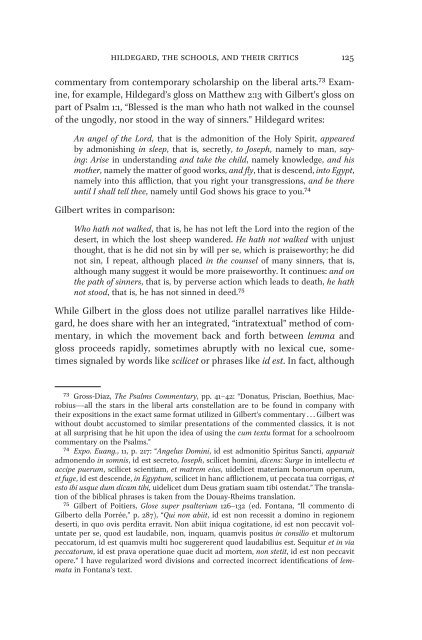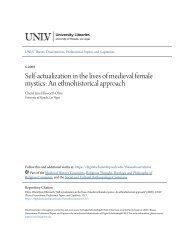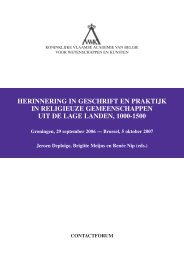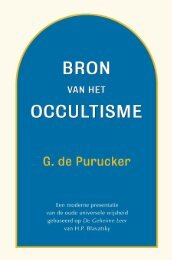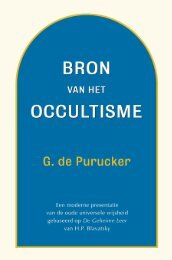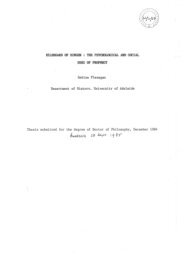A Companion to Hildegard of Bingen
Beverly Mayne Kienzle, Debra L. Stoudt & George Ferzoco, "A Companion to Hildegard of Bingen". BRILL, Leiden - Boston, 2014.
Beverly Mayne Kienzle, Debra L. Stoudt & George Ferzoco, "A Companion to Hildegard of Bingen". BRILL, Leiden - Boston, 2014.
- TAGS
- hildegard-of-bingen
Create successful ePaper yourself
Turn your PDF publications into a flip-book with our unique Google optimized e-Paper software.
hildegard, the schools, and their critics 125<br />
commentary from contemporary scholarship on the liberal arts.73 Examine,<br />
for example, <strong>Hildegard</strong>’s gloss on Matthew 2:13 with Gilbert’s gloss on<br />
part <strong>of</strong> Psalm 1:1, “Blessed is the man who hath not walked in the counsel<br />
<strong>of</strong> the ungodly, nor s<strong>to</strong>od in the way <strong>of</strong> sinners.” <strong>Hildegard</strong> writes:<br />
An angel <strong>of</strong> the Lord, that is the admonition <strong>of</strong> the Holy Spirit, appeared<br />
by admonishing in sleep, that is, secretly, <strong>to</strong> Joseph, namely <strong>to</strong> man, saying:<br />
Arise in understanding and take the child, namely knowledge, and his<br />
mother, namely the matter <strong>of</strong> good works, and fly, that is descend, in<strong>to</strong> Egypt,<br />
namely in<strong>to</strong> this afffliction, that you right your transgressions, and be there<br />
until I shall tell thee, namely until God shows his grace <strong>to</strong> you.74<br />
Gilbert writes in comparison:<br />
Who hath not walked, that is, he has not left the Lord in<strong>to</strong> the region <strong>of</strong> the<br />
desert, in which the lost sheep wandered. He hath not walked with unjust<br />
thought, that is he did not sin by will per se, which is praiseworthy; he did<br />
not sin, I repeat, although placed in the counsel <strong>of</strong> many sinners, that is,<br />
although many suggest it would be more praiseworthy. It continues: and on<br />
the path <strong>of</strong> sinners, that is, by perverse action which leads <strong>to</strong> death, he hath<br />
not s<strong>to</strong>od, that is, he has not sinned in deed.75<br />
While Gilbert in the gloss does not utilize parallel narratives like <strong>Hildegard</strong>,<br />
he does share with her an integrated, “intratextual” method <strong>of</strong> commentary,<br />
in which the movement back and forth between lemma and<br />
gloss proceeds rapidly, sometimes abruptly with no lexical cue, sometimes<br />
signaled by words like scilicet or phrases like id est. In fact, although<br />
73 Gross-Diaz, The Psalms Commentary, pp. 41–42: “Donatus, Priscian, Boethius, Macrobius—all<br />
the stars in the liberal arts constellation are <strong>to</strong> be found in company with<br />
their expositions in the exact same format utilized in Gilbert’s commentary . . . Gilbert was<br />
without doubt accus<strong>to</strong>med <strong>to</strong> similar presentations <strong>of</strong> the commented classics, it is not<br />
at all surprising that he hit upon the idea <strong>of</strong> using the cum textu format for a schoolroom<br />
commentary on the Psalms.”<br />
74 Expo. Euang., 11, p. 217: “Angelus Domini, id est admonitio Spiritus Sancti, apparuit<br />
admonendo in somnis, id est secre<strong>to</strong>, Ioseph, scilicet homini, dicens: Surge in intellectu et<br />
accipe puerum, scilicet scientiam, et matrem eius, uidelicet materiam bonorum operum,<br />
et fuge, id est descende, in Egyptum, scilicet in hanc affflictionem, ut peccata tua corrigas, et<br />
es<strong>to</strong> ibi usque dum dicam tibi, uidelicet dum Deus gratiam suam tibi ostendat.” The translation<br />
<strong>of</strong> the biblical phrases is taken from the Douay-Rheims translation.<br />
75 Gilbert <strong>of</strong> Poitiers, Glose super psalterium 126–132 (ed. Fontana, “Il commen<strong>to</strong> di<br />
Gilber<strong>to</strong> della Porrée,” p. 287), “Qui non abiit, id est non recessit a domino in regionem<br />
deserti, in quo ovis perdita erravit. Non abiit iniqua cogitatione, id est non peccavit voluntate<br />
per se, quod est laudabile, non, inquam, quamvis positus in consilio et mul<strong>to</strong>rum<br />
pecca<strong>to</strong>rum, id est quamvis multi hoc suggererent quod laudabilius est. Sequitur et in via<br />
pecca<strong>to</strong>rum, id est prava operatione quae ducit ad mortem, non stetit, id est non peccavit<br />
opere.” I have regularized word divisions and corrected incorrect identifijications <strong>of</strong> lemmata<br />
in Fontana’s text.


